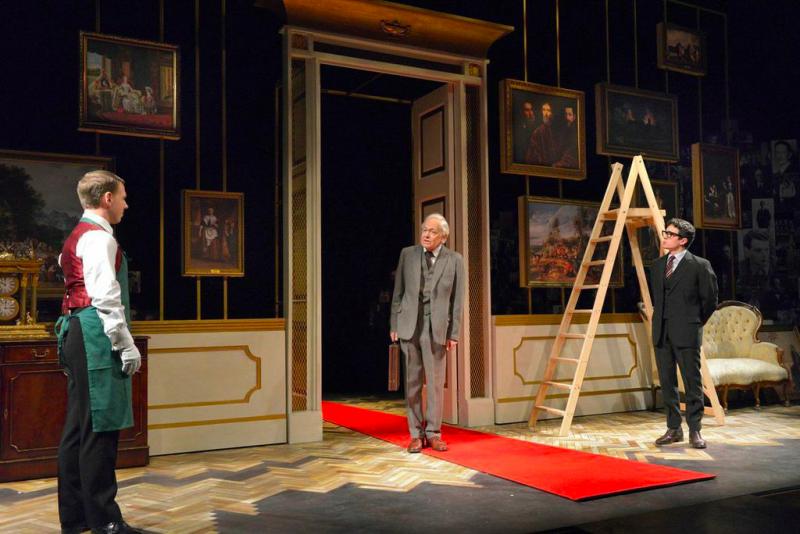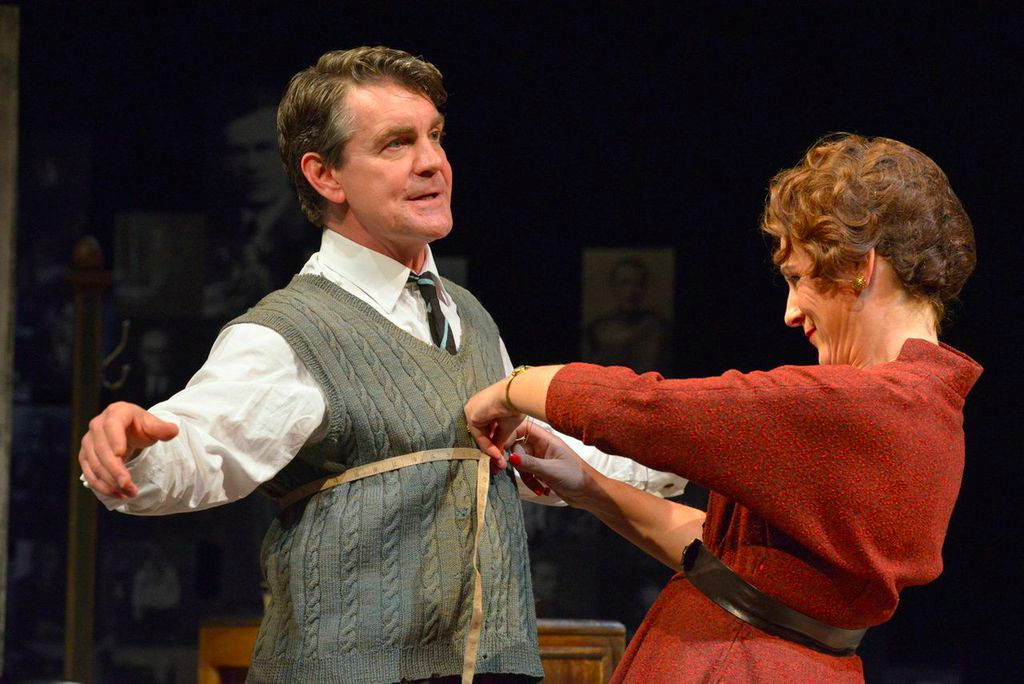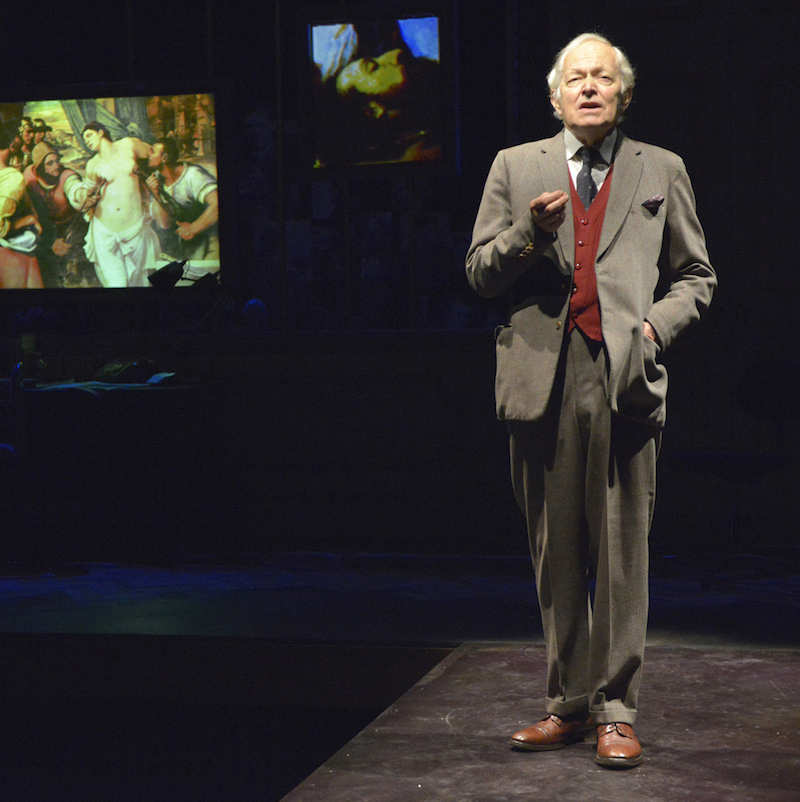Single Spies, Rose Theatre, Kingston | reviews, news & interviews
Single Spies, Rose Theatre, Kingston
Single Spies, Rose Theatre, Kingston
Alan Bennett's 'spy' plays about Burgess and Blunt continue to be relevant

Alan Bennett’s 80th birthday last May deserves celebrating not just as a point of respect for a formidable playwright but with awe at his continuing liveliness. More than 40 years after 40 Years On, he is still producing hits, and at Kingston’s Rose an opportune revival of two of his spy plays from the 1980s reminds us that the cuddly Yorkshire macaroon-lover with the swot’s glasses is quite the George Smiley: there are mercilessly observant eyes behind those lenses.
It was under the last Soviet president Gorbachev, when the Cold War was a permanent feature of contemporary history still, that he wrote his plays about Guy Burgess and Sir Anthony Blunt, linked in the Cambridge spy ring of the Thirties. The earlier, An Englishman Abroad, was immortalized (and inoculated against future interpretation) by the magnificent TV version with Alan Bates and Coral Browne, who played - of course - herself, in a fictionalizing of her meeting with Burgess in Moscow in 1958. The second, A Question of Attribution, imagined the Queen chatting briefly, but lethally, with Blunt, when he was the Surveyor of the Royal pictures.
Burgess and Blunt being upper-class were afforded an enviable freedom, to behave outrageously and yet retain public standing
In both of them a woman sees through a man, though he has been exposed in the first play, and deliberately not exposed in the second. The Blunt play is the more densely argued and anxious of the two, more about the value of truth than the first, which disguises the seriousness of the central question under a bravura drawing-room character comedy.
The time lapse seems striking now. Bennett could not have forecast that the USSR would collapse a few years later, and with it (for a time at least) the espionage culture that he lampoons. Burgess and Blunt being upper-class were afforded an enviable freedom, to behave outrageously and yet retain public standing because of the cost to establishment "face" of exposing them. A generation on, the spying and enemies have changed. As if to atone for past laxness, policing authorities have made the entire public suspect now. In this sense, watching these plays now is a bitter experience; the snobbery and dreadful negligence targeted by Bennett seem a particularly wretched basis for the cries today for total submission by the British population to surveillance.
 Hence it's disarming to hear the simplicity of the idea in An Englishman Abroad that Burgess may have added so significantly to the gaiety of Whitehall and Soho that his fate to live out his days in Soviet deprivation, surrounded by an uncomprehending audience, was cruel and unusual punishment. Coral Browne - pointing out that she's Australian, not British - takes an off-piste view that charm may take even a rascal a long way. But in a splendid hinge in their encounter she also sternly warns Burgess that making a fool out of people is a serious offence - and she isn't fooled. (Above right, Helen Schlesinger's Coral Browne measures up Alexander Hanson as Burgess)
Hence it's disarming to hear the simplicity of the idea in An Englishman Abroad that Burgess may have added so significantly to the gaiety of Whitehall and Soho that his fate to live out his days in Soviet deprivation, surrounded by an uncomprehending audience, was cruel and unusual punishment. Coral Browne - pointing out that she's Australian, not British - takes an off-piste view that charm may take even a rascal a long way. But in a splendid hinge in their encounter she also sternly warns Burgess that making a fool out of people is a serious offence - and she isn't fooled. (Above right, Helen Schlesinger's Coral Browne measures up Alexander Hanson as Burgess)
In Browne's comic rounds of Jermyn Street to acquire a “trousseau” of suits and pyjamas to allow Burgess to maintain Old Etonian appearance even in Stalinist Moscow, one’s in danger of forgetting the core matter. He is, after all, something more than a charmer who swanned off on a regrettable foreign adventure. Or is he? Bennett teasingly avoids the question.
Sir Anthony Blunt presents a drier and less colourful personality, and one might almost fancy that Bennett was using Chubb, the cheerful intelligence officer who grills Blunt once a month, as his own mole into this secretive, enigmatic figure. The outrageous truth is that Blunt's spying was known about from 1964 but a conspiracy of silence ensured that he turned informant against the Soviets in return for keeping his position - for 15 years. A parallel to Chubb’s pursuit of further members of the Cambridge spy ring arises with a Titian painting Blunt is investigating. X-rays have shown it contains a third, fourth and fifth figures at various stages. How important is it to the whole painting to have these figures uncovered? Blunt argues that it is of academic interest only.
It’s a nice device, and provides much entertaining double-speak. like Blunt’s most damning admission, that even an expert art historian need not have “an eye”, the intuition to spot a fake. Fake though Blunt is himself, he can't actually spot a fake. That it's the Queen who seems to have the "eye" is a cunning playwright's invention (the reality is that she had long known Blunt was a spy - Bennett labels these "imaginary circumstances").
 I suppose my emphasis on the enjoyment of the plays themselves is a tell that I feel less enthusiasm for Sarah Esdaile’s production. The male performances are fine - Michael Pennington (left) towers over the evening as Blunt, the perfect aristocratic mandarin, starchy, wary, examining every question before answering it. Alexander Hanson (recently of Stephen Ward) has the charm for Guy Burgess, though suggesting a man of no possible significance. Alex Blake as a winningly sneaky Chubb has a Bennettian peach of a line, where he describes visiting an art gallery as "profoundly troubling", in contrast to the reassuring calm of a museum.
I suppose my emphasis on the enjoyment of the plays themselves is a tell that I feel less enthusiasm for Sarah Esdaile’s production. The male performances are fine - Michael Pennington (left) towers over the evening as Blunt, the perfect aristocratic mandarin, starchy, wary, examining every question before answering it. Alexander Hanson (recently of Stephen Ward) has the charm for Guy Burgess, though suggesting a man of no possible significance. Alex Blake as a winningly sneaky Chubb has a Bennettian peach of a line, where he describes visiting an art gallery as "profoundly troubling", in contrast to the reassuring calm of a museum.
But Helen Schlesinger as Coral Browne and HMQ is much less persuasive - a pity, given that this double-casting is the lynchpin of the night. Her voice is too light and unweighted to carry in the Rose, and she is more Estuary than Buckingham Palace in her Queen voice. She seems curiously uncertain in her dynamic pitch of either character, and her wigs and clothes are also not good. The general lack of flair in the staging (especially of the first play) comes down to direction.
rating
Explore topics
Share this article
The future of Arts Journalism
You can stop theartsdesk.com closing!
We urgently need financing to survive. Our fundraising drive has thus far raised £33,000 but we need to reach £100,000 or we will be forced to close. Please contribute here: https://gofund.me/c3f6033d
And if you can forward this information to anyone who might assist, we’d be grateful.

Subscribe to theartsdesk.com
Thank you for continuing to read our work on theartsdesk.com. For unlimited access to every article in its entirety, including our archive of more than 15,000 pieces, we're asking for £5 per month or £40 per year. We feel it's a very good deal, and hope you do too.
To take a subscription now simply click here.
And if you're looking for that extra gift for a friend or family member, why not treat them to a theartsdesk.com gift subscription?
more Theatre
 Twelfth Night, Royal Shakespeare Theatre review - comic energy dissipates in too large a space
Too much thinking; not enough laughing
Twelfth Night, Royal Shakespeare Theatre review - comic energy dissipates in too large a space
Too much thinking; not enough laughing
 You Me Bum Bum Train, secret location review - a joyful multiverse of anarchic creativity
This latest incarnation of the show is a wild, spinning ride through different forms of reality
You Me Bum Bum Train, secret location review - a joyful multiverse of anarchic creativity
This latest incarnation of the show is a wild, spinning ride through different forms of reality
 The Tempest, Theatre Royal, Drury Lane review - Sigourney Weaver's impassive Prospero inhabits an atmospheric, desolate world
Magic is minimised in Jamie Lloyd's pared-back version
The Tempest, Theatre Royal, Drury Lane review - Sigourney Weaver's impassive Prospero inhabits an atmospheric, desolate world
Magic is minimised in Jamie Lloyd's pared-back version
 Natasha, Pierre & the Great Comet of 1812, Donmar Warehouse review - a blazingly original musical flashes into the West End
War and Peace - but not as you know it
Natasha, Pierre & the Great Comet of 1812, Donmar Warehouse review - a blazingly original musical flashes into the West End
War and Peace - but not as you know it
 The Invention of Love, Hampstead Theatre review - beautiful wit, awkward staging
Tom Stoppard’s evocation of Victorian golden age Oxford stars Simon Russell Beale
The Invention of Love, Hampstead Theatre review - beautiful wit, awkward staging
Tom Stoppard’s evocation of Victorian golden age Oxford stars Simon Russell Beale
 Matthew Bourne's Swan Lake, New Adventures, Sadler's Wells review - 30 years on, as bold and brilliant as ever
A masterly reinvention has become a classic itself
Matthew Bourne's Swan Lake, New Adventures, Sadler's Wells review - 30 years on, as bold and brilliant as ever
A masterly reinvention has become a classic itself
 The Little Foxes, Young Vic review - timeshifted production blurs the play's focus
Lillian Hellman’s family feud set in 1900 Alabama doesn’t survive a confused updating
The Little Foxes, Young Vic review - timeshifted production blurs the play's focus
Lillian Hellman’s family feud set in 1900 Alabama doesn’t survive a confused updating
 The Legends of Them, Royal Court review - reaching out for serenity
Gig theatre piece about the pain and redemption of a pioneer reggae artist
The Legends of Them, Royal Court review - reaching out for serenity
Gig theatre piece about the pain and redemption of a pioneer reggae artist
 The Producers, Menier Chocolate Factory review - liberating taboo-busting fun for grown-ups
Director Patrick Marber does Mel Brooks's musical proud
The Producers, Menier Chocolate Factory review - liberating taboo-busting fun for grown-ups
Director Patrick Marber does Mel Brooks's musical proud
 A Midsummer Night's Dream, RSC, Barbican review - visually ravishing with an undercurrent of violence
This psychedelic mashup conveys a sci-fi-style alternate reality
A Midsummer Night's Dream, RSC, Barbican review - visually ravishing with an undercurrent of violence
This psychedelic mashup conveys a sci-fi-style alternate reality
 The Devil Wears Prada, Dominion Theatre review - efficient but rarely inspired
Relaunch of Elton John musical needs further tinkering still
The Devil Wears Prada, Dominion Theatre review - efficient but rarely inspired
Relaunch of Elton John musical needs further tinkering still

Add comment